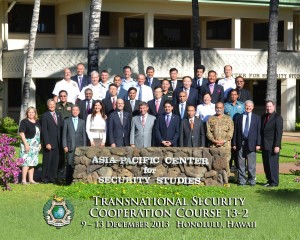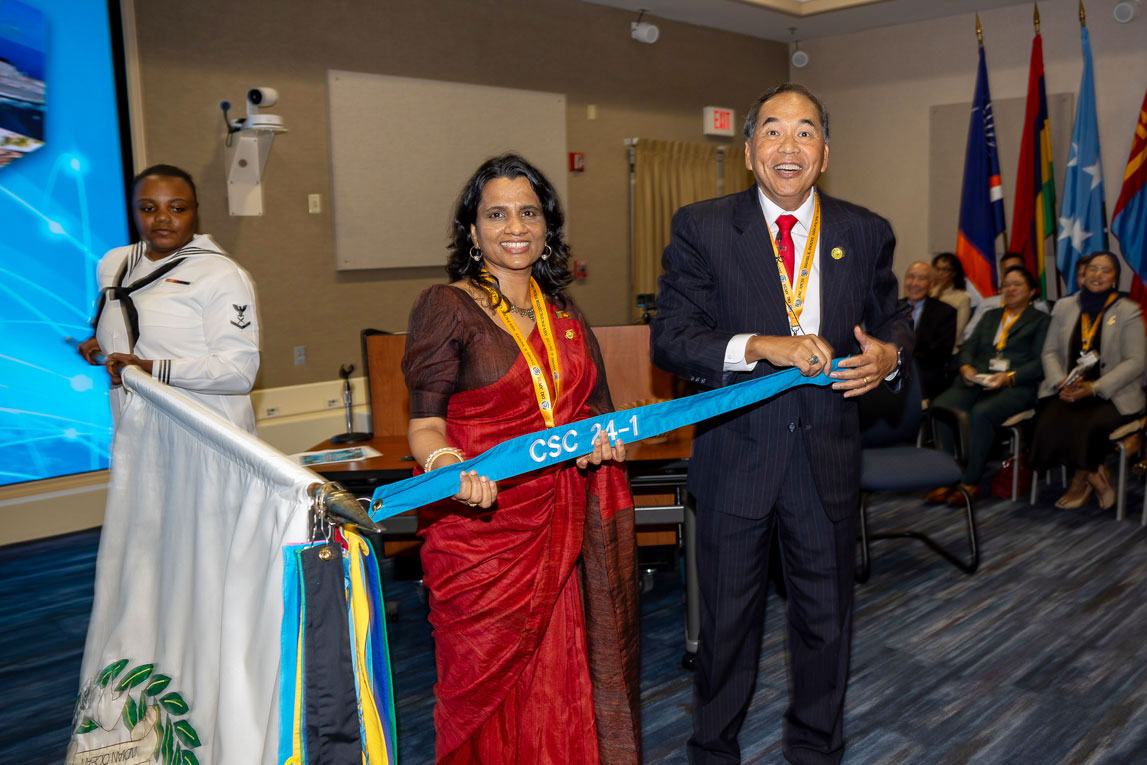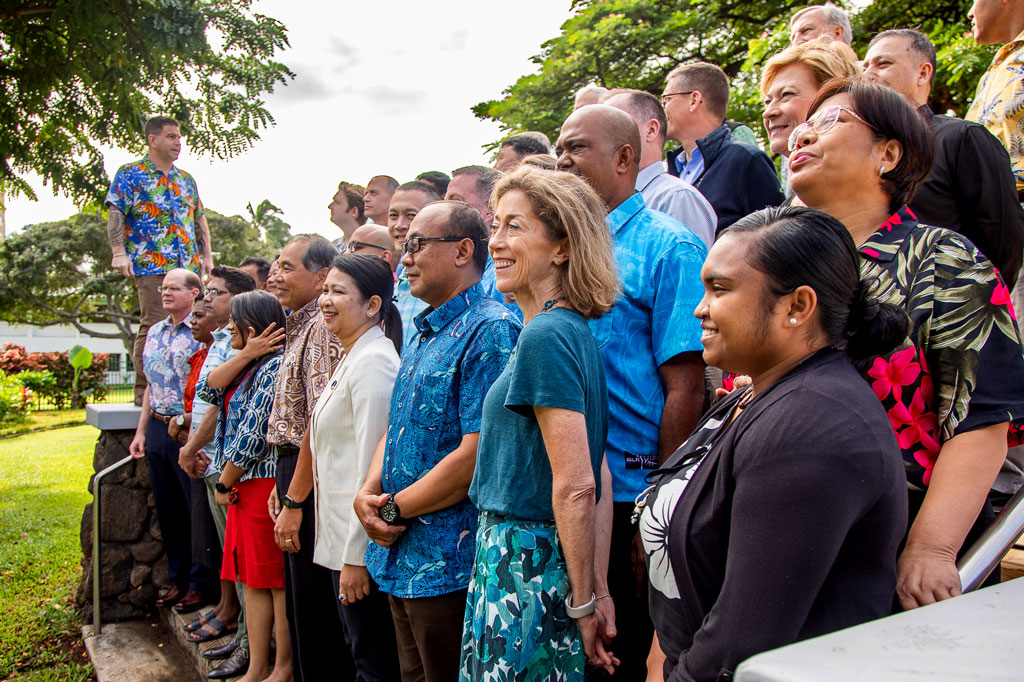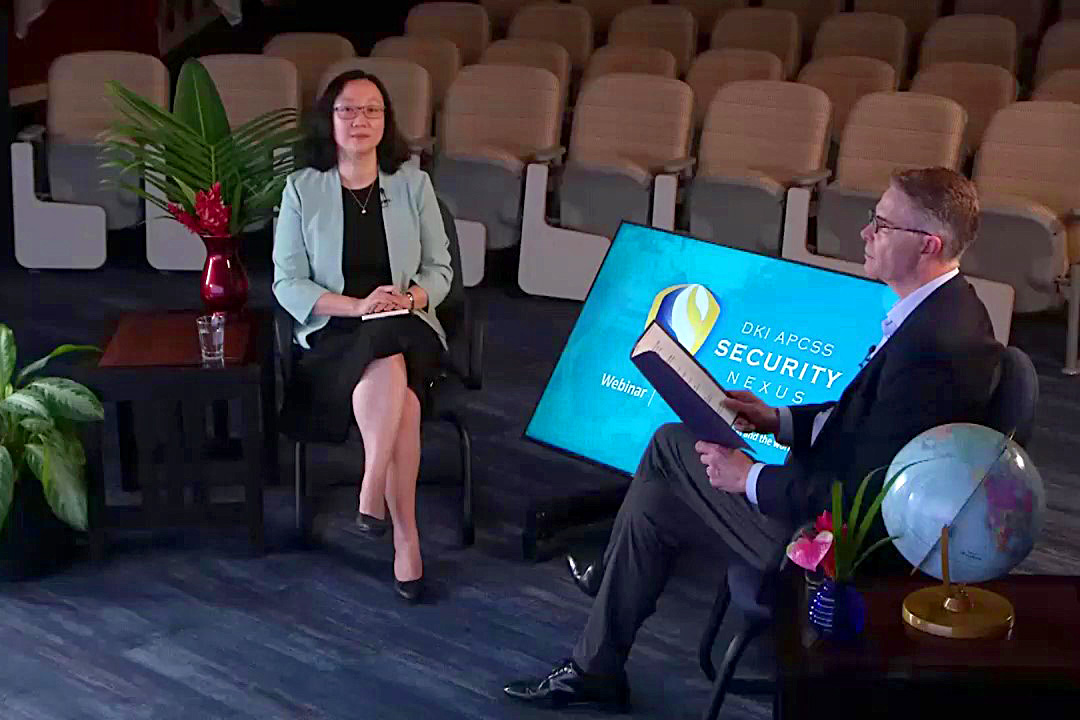 Twenty-nine senior executives from 27 locations completed the Transnational Security Cooperation (TSC) course December 13 at the Asia-Pacific Center for Security Studies in Honolulu. They included military and civilian leaders from Afghanistan, Australia, Bangladesh, Cambodia, Canada, Chile, China, Hong Kong, India, Indonesia, Japan, Laos, Malaysia, Mexico, Mongolia, Myanmar, Nepal, New Zealand, Pakistan, Papua-New Guinea, the Philippines, Republic of Korea, Russia, Sri Lanka, Thailand, the United States and Vietnam.
Twenty-nine senior executives from 27 locations completed the Transnational Security Cooperation (TSC) course December 13 at the Asia-Pacific Center for Security Studies in Honolulu. They included military and civilian leaders from Afghanistan, Australia, Bangladesh, Cambodia, Canada, Chile, China, Hong Kong, India, Indonesia, Japan, Laos, Malaysia, Mexico, Mongolia, Myanmar, Nepal, New Zealand, Pakistan, Papua-New Guinea, the Philippines, Republic of Korea, Russia, Sri Lanka, Thailand, the United States and Vietnam.
The course is an intensive program for current and future senior regional influencers/leaders; military officers at the one-to-four-star levels, as well as their civilian equivalents from the Asia-Pacific region.
The curriculum highlights emerging security issues in the region, with an emphasis on those requiring regional collaboration. A wide range of topics are covered in plenary presentations and elective sessions, including demographic change, economics, cyber security, transnational crime, climate change, and resource scarcity.
The course includes interactive polling, a scenario development exercise, and discussions with senior officials during a session at the U.S. Pacific Command headquarters. Additionally, in this course, guest speaker APCSS alumnus Cyril P. Cusi (ASC09-1) from the Philippines presented his perspective on security sector assessments.
“We were honored to have such a lively and engaging group of senior Fellows in the course. Their insights and experiences added depth to the discussions and created connections which will last long beyond their week together in Hawaii,” said course manager Dr. Lori Forman.
Course Fellows shared their appreciation for what they gained in the course in a post course survey. One stated that, “security is the factor somehow relatively connecting with the politics, economy and social life of the country. Before attending this meeting, I thought that security was only the matter of security agencies and organizations such as Ministry of Defense, Ministry of Home Affairs, etc. But now I have gained knowledge that other agencies like health, social welfare, disaster management, information technology are also involved in the security cooperation.”
Another said that “[TSC showed us] the high degree of interactivity between all the pacific regions. The countries which are located at the Pacific Rim deal with the same risks and national security threats. Natural disasters, for instance, represent a serious threat to the [whole] rim. Fostering cooperation between both sides of the rim is critical. Isolation is no longer a way to respond to security challenges today.”
In the end, one Fellow summed up the course in by tweeting: “Best learning experience at @APCSS. Studies on Transnational Security Issues with Asia Pacific govt executives.”
The Asia-Pacific Center for Security Studies is a Department of Defense institute that addresses regional and global security issues. Military and civilian representatives, most from the U.S. and Asia-Pacific nations, participate in a comprehensive program of executive education, professional exchanges and outreach events, both in Hawaii and throughout the Asia-Pacific region. The Center supports the U.S. Pacific Command by developing and sustaining relationships among security practitioners and national security establishments throughout the region. Its mission is to build capacities and communities of interest by educating, connecting, and empowering security practitioners to advance Asia-Pacific security. It is one of the Department of Defense’s five regional security studies centers.
Since opening in 1995, APCSS has had representatives from 104 countries and territories, and seven international organizations attend courses at the Center for a total of 7,931 alumni.
-END-
For more photos of TSC 13-2, go to our photo album on Facebook.









Leave A Comment